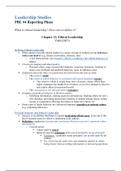Leadership Studies
PBL #4 Reporting Phase
What is ethical leadership? How can we define it?
Chapter 13: Ethical Leadership
Yukl (2013)
Defining Ethical Leadership
When asked to describe ethical leaders in a study, executives defined several behaviors,
values and motives (e.g. honest, trustworthy, altruistic, fair)
o A key characteristic was a leader’s efforts to influence the ethical behavior of
others
Criteria for judging individual leaders:
o Personal values, stage of moral development, conscious intentions, freedom of
choice, use of ethical and unethical behavior, types of influence used
Judgments about the ethics of a particular decision/action take into account:
o The purpose (ends)
o The extent to which behavior is consistent with moral standards (means)
The extent to which it violate basic laws of society, denies others their
rights, endangers the health/lives of others, or involves attempts to deceive
and exploit others for personal benefit
o The consequences for self and others (outcomes)
Examples of unethical behavior in Western nations:
o Falsifying information, stealing assets for personal use, blaming others for one’s
own mistakes, provoking unnecessary hostility or distrust among others, selling
secrets to competitors, showing favoritism in return for a bribe, etc.
Some types of leader behavior are considered improper regardless of national culture
(e.g. exploiting followers)
Personal Integrity and Ethical Leadership
Integrity is an attribute that helps to explain leadership effectiveness; at the top of the
list of essential traits for effective leadership in all cultures
Definition: emphasizes honesty and consistency between a person’s espoused values
and behavior
o Considerations:
Values must be moral
Behavior must be consistent with a set of justifiable moral principles
Limitation: ‘justifiable moral principles’ are not the same for all
cultures
E.g. observing the same rules and standards applied to others,
being honest when providing information or answering questions,
, keeping promises and commitments, acknowledging responsibility
for mistakes and seeking to correct them
To be ethical, the leader must intend no harm and respect the rights of all affected parties
Dilemmas in Assessing Ethical Leadership
In many situations the influence process may involve:
1. Creating enthusiasm for a risky strategy or project
2. Inducing followers to change their underlying beliefs and values
3. Influencing decisions that will benefit some people at the expense of others
Each type of influence involves ethical dilemmas
Influencing Expectations
How a leader influences follower perception of the risks and prospects for success of a new
strategy/project is relevant for evaluating ethical leadership
Ethical standard: leader must fully inform followers about the likely costs and benefits
of a risky venture, and ask followers to make a conscious decision about whether the
effort is worthwhile
o It is unethical for a leader to deliberately manipulate followers to do something
contrary to their self-interest by making false promises or deceiving them about
likely outcomes
Heifetz (1994): important to help people understand a problem without demoralizing
them
o Effective leaders do not dwell too much on the risks or obstacles, but instead
emphasize what can be accomplished with a concerted, shared effort
Influencing Values and Beliefs
Opposing View
Some believe changing the underlying values and beliefs of individual followers is
unethical, even when the intended outcome is to benefit followers as well as the
organization
o Does the leader know what is best for the followers?
o Misuse of power and control over information to bias follower perceptions about
problems and events
Supporting View
Others believe that leaders have a responsibility to implement major changes in an
organization when necessary to ensure its survival and effectiveness; large-scale
change will not be successful without changes in member beliefs and perceptions
Effective leaders engage in a dialogue with others to determine:
o What changes are necessary
o What changes are morally right
Multiple Stakeholders and Competing Values
The same actions that…
, o Benefit followers in some ways may also harm followers in other ways or at a
later time
o Serve the interests of some followers may be contrary to the interests of other
followers
o Benefit one type of stakeholder (e.g. owners) may not be what is best for others
(e.g. employees, customers, the community)
More difficult to evaluate ethical leadership when stakeholders have incompatible
preferences
Different perspectives:
1. Managers in business organizations are agents who represent the interest of the
owners in achieving economic success for the organization
Ethical leadership is satisfied by maximizing economic outcomes that benefit
owners while not doing anything strictly prohibited by laws and moral
standards (e.g. moving manufacturing plant from Kansas to Mexico)
2. Managers should serve multiple stakeholders inside and outside the organization
Judgments about ethical leadership must take into account the extent to which
a leader balances and integrates the interests of different stakeholders within
the constraints imposed by legal and contractual obligations
Integrative solution is not always possible when different stakeholders have
incompatible objectives
Leaders sometimes have an opportunity to support a worthy cause, even
though it does not provide any short-term benefit to the financial performance
of the organization
Determinants and Consequences of Ethical Leadership
Individual Determinants of Ethical Leadership
Ethical leadership is related to a leader’s personality traits and needs
Unethical, abusive leadership is more likely to occur in a person who has:
o Low conscientiousness
o High neuroticism
o High narcissism
o Personalized power orientation
Emotionally mature leaders with a socialized
power orientation, a high level of cognitive moral
development, and a strong moral identity more
likely to resist the temptation to use their power to
exploit others
Kohlberg’s Theory of Moral Development
Six sequential stages:
1. Lowest level: motivation is self-interest and
satisfaction of needs
2. Middle level: motivation is to satisfy role
expectations and social norms






